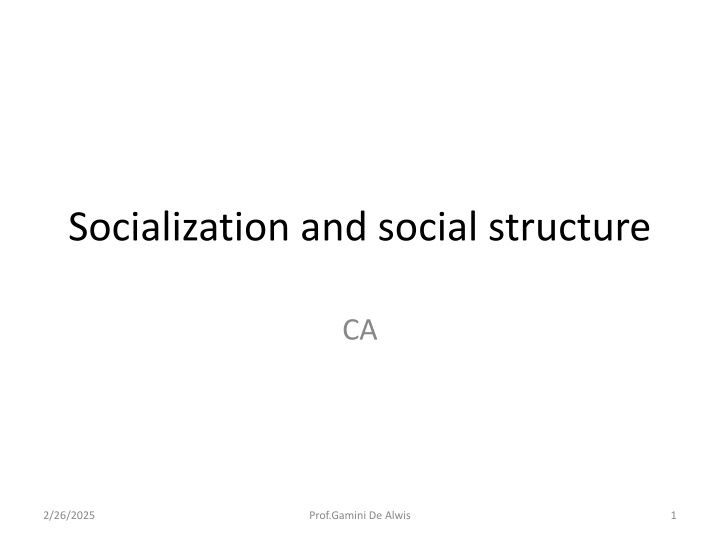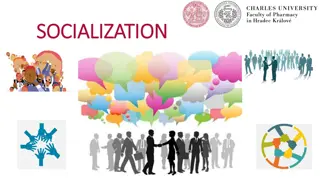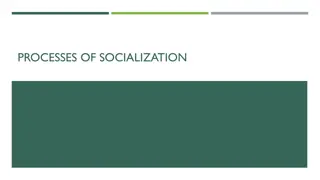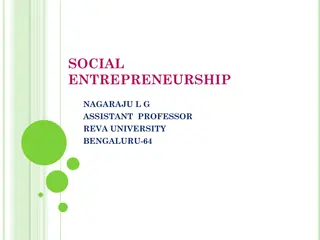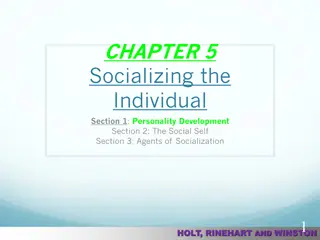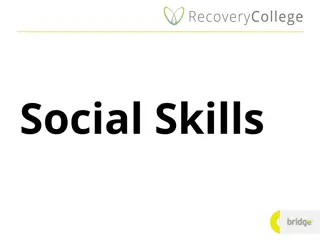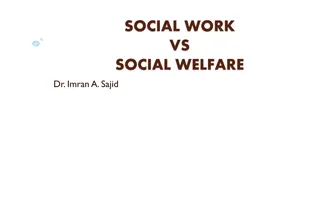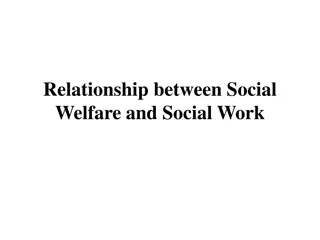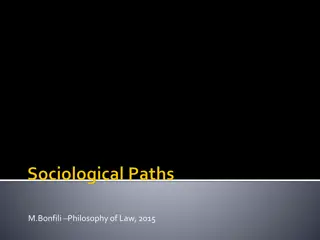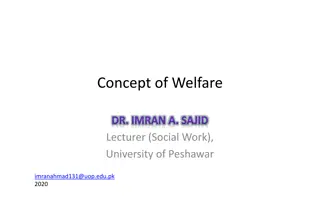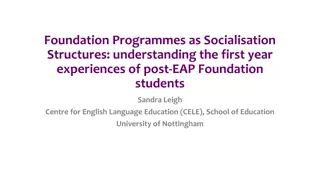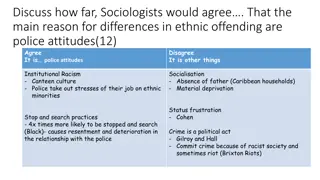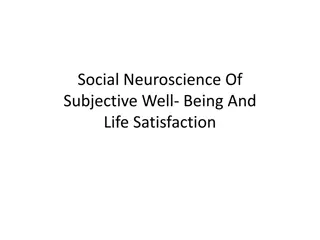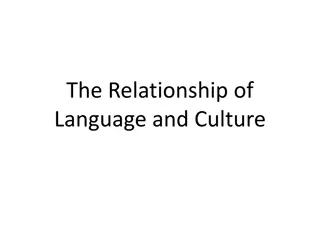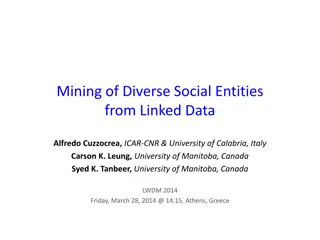Socialization and social structure
Social structure plays a significant role in shaping individuals' interactions within society. It encompasses elements such as social status, roles, groups, and institutions, impacting how people behave and relate to one another. Socialization, on the other hand, is the process through which individuals acquire the necessary skills and attitudes to fulfill social roles. Various agents of socialization, including family, schools, media, and different organizations, influence this developmental process. Additionally, achieving social status can be either ascribed or achieved, leading to the formation of social roles and potential role conflicts. Overall, understanding social structure and the practices of socialization are fundamental to comprehending human behavior in different societal contexts.
Download Presentation

Please find below an Image/Link to download the presentation.
The content on the website is provided AS IS for your information and personal use only. It may not be sold, licensed, or shared on other websites without obtaining consent from the author.If you encounter any issues during the download, it is possible that the publisher has removed the file from their server.
You are allowed to download the files provided on this website for personal or commercial use, subject to the condition that they are used lawfully. All files are the property of their respective owners.
The content on the website is provided AS IS for your information and personal use only. It may not be sold, licensed, or shared on other websites without obtaining consent from the author.
E N D
Presentation Transcript
Socialization and social structure CA 2/26/2025 Prof.Gamini De Alwis 1
Socialization - Without socialization, social life would be impossible. Socialization is the process by which people learn the skills and attitudes relevant to social roles. Socialization help to: 1. understanding of required for social roles. 2. development of skills necessary for performing social roles. 3. creation of both ability and the desire to conform. 2/26/2025 Prof.Gamini De Alwis 2
Agents of socialization Family (father, mother, brothers and sisters, other relations) Schools (Teachers, Friends) Leaders of the area, country. Mass media Different training organizations Offices factories Other organizations : dept: of police, prison etc 2/26/2025 Prof.Gamini De Alwis 3
Social interaction The process in which people act and react to one another 2/26/2025 Prof.Gamini De Alwis 4
Elements of social structure Social status Social roles Social groups Social institutions 2/26/2025 Prof.Gamini De Alwis 5
Social structure. Status : any of the full range of socially defined positions within large group or society- from the lowest to highest position. Ascribed status: is assigned to a person by society without regard for the person s unique talents or characteristics. (Male/female, Daughter / son, old/young man) 2/26/2025 Prof.Gamini De Alwis 6
Social structure Achieved status: is attained by a person largely his or her own efforts. (student, friend, employee, union president etc) Social roles : is a set of expectations for people who occupy a given social positions or status. (father, student, driver etc) 2/26/2025 Prof.Gamini De Alwis 7
Social structure Role conflicts: occurs when incompatible expectations arise from two or more social positions held by the same person. It call for important ethical choices. Social groups : is any number of people with similar norms, values, and expectations who regularly and consciously interact. It lead to social interactions and social network 2/26/2025 Prof.Gamini De Alwis 8
Social Structure Groups play a vital role in society s social structure. Social interaction take place within and among groups. Interaction is influenced by the norms and sanctions of groups. Primary groups: small groups 2/26/2025 Prof.Gamini De Alwis 9
Social structure Primary group:: a small group characterized by intimate, face to face association and cooperation. Secondary group: a formal , impersonal group. Reference group: any group that individuals use as a standard for evaluating themselves and their own behavior. 2/26/2025 Prof.Gamini De Alwis 10
What is Social institution? A social Institution that satisfies a basic human need and function, and thus is necessary for the survival of society. Social institution is a group of social positions, connected by social relations, performing a social role. It can be also defined in a narrow sense as any institution in a society that works to socialize the groups or people in it.. It is a major sphere of social life organized to meet some human needs. 2/26/2025 Prof.Gamini De Alwis 11
Commonly define social institutions are Family Institution Economic Institution Education Institution Political Institution Religion Institution 2/26/2025 Prof.Gamini De Alwis 12
Each society has its own social institutions. These are not buildings or places, but structures of relationship, obligation, role and function. Members of a society have a similar mental concept of right and wrong, order and relationships, and patterns of good (positive values). Those who do not honor these concepts are "criminals," or at least antisocial. 2/26/2025 Prof.Gamini De Alwis 13
The term, institution, is commonly applied to customs and behavior patterns important to a society, as well as to particular formal organizations of government and public service. Among the oldest human institutions is the family which prepares the child for life in society and provides both child and adult with emotional support. 2/26/2025 Prof.Gamini De Alwis 14
The Family as a social institution What is family A group of people directly linked by kin connection, where the adult members take responsibility for caring for children (Giddens 1989:384). Family Relationships The nuclear family which consists of two adults living together in a household with their own or adopted children. In a household where kin other than a married couple and children live either in the same household or in close and continuous contact with one another, we call the extended family. Place of residence: Matrilocal, the couple moves to live near or with the bride s parents Patrilocal, the groom parents of 2/26/2025 Prof.Gamini De Alwis 15
Family Forms Nuclear Family- parents and own children (natural or adopted). This is the basic human social unit, and Extended Family- usually are talking about several generations often sharing a single household (parents, grandparents, adult children, aunts and uncles, children). 2/26/2025 Prof.Gamini De Alwis 16
The family has many forms, ranging from the two-parent family, single-parents, blended families (living together), same-sex families (Gay and lesbian), adoptive families, Mix families (racial) and the list goes on. 2/26/2025 Prof.Gamini De Alwis 17
Roles of Family Talcott Parsons treated the family as a small group that served basic functions for the larger society, including reproduction, regulation of sexual behavior, socialization into adult roles, welfare and protective functions, economic and emotional support and recreation and leisure. 2/26/2025 Prof.Gamini De Alwis 18
Changes in Family When the activities and roles in the family change the relationships within the family change as well. To-day social and civic agencies, in taking over most of these parental responsibilities Family as consumption and production unit. Historically, nearly everything that the ordinary family consumed it had to produce. 2/26/2025 Prof.Gamini De Alwis 19
Current issues in the Sociology of the Family Family breakdown and divorce are significant part of contemporary family life and affect all levels of society Increasing Cohabitation Remarriage Single parent families Elderly people Domestic violence Child abuse 2/26/2025 Prof.Gamini De Alwis 20
Religious Institution Religion may be said to be a system of belief about the individual s place in the world, providing an order to that world and a reason for existence within it. Religion has a major influence in societies, affecting non-religious institutions specially, such as the family, politics, as well as bringing about general social change, indicated by the great religious wars, the reformist movements, the contemporary Islamic revolutions, and so. 2/26/2025 Prof.Gamini De Alwis 21
Educational Institution Educational: Even in "primitive" societies, there are highly developed methods of conveying knowledge and values. These methods will affect reception of new ideas. Education is a lifelong process, involving both formal and informal institutions of learning. Sociology understands the need of education as a process of transmission/communication of group heritage, common to all societies. 2/26/2025 Prof.Gamini De Alwis 22
Education in the largest sense is any act or experience that has a formative effect on the mind, character or physical ability of an individual. In its technical sense, education is the process by which society deliberately transmits its accumulated knowledge, skills and values from one generation to another. 2/26/2025 Prof.Gamini De Alwis 23
Types of Education Preschool education Primary education Secondary education Higher education Adult education Alternative education Indigenous education 2/26/2025 Prof.Gamini De Alwis 24
Economic Institution Money is to the West what kinship is the Rest Marshall Sahlins Socio-cultural base of Economic Institution Economic life of people Economy is not simply material survival Different economic systems Non-capitalist and capitalist 2/26/2025 Prof.Gamini De Alwis 25
Economic: This involves the production of goods and the organization of labor, the provision of care and similar factors, not just money, buying and selling. Every society has systems of provision or procurement. Economic and political institutions are related. 2/26/2025 Prof.Gamini De Alwis 26
Production Distribution (Market: exchange) Consumption Pre-modern or Non-capitalist Economic Institution household economy kinship base system (labour, land etc.) Exchange material and non-material product Produce for consumptions Surplus redistribute 2/26/2025 Prof.Gamini De Alwis 27
Political Institution Political: Every society has an organizational principle, with authority figures, with defined roles and obligations. There are written or oral laws. Some societies are tightly knit, while others are very loosely organized. The Luo people, for instance, traditionally had no chiefs, the society being organized around families. 2/26/2025 Prof.Gamini De Alwis 28
Politics is linked with power; power that people exert over each other, and ways of society wields power over people by imposing institutionalized constrains ranging from property taxes to torture and genocide. Politics also has to do with the prevention of lawlessness (arajika) and insecurity. 2/26/2025 Prof.Gamini De Alwis 29
A sociological analysis of politics concentrates on political behaviour within a social context, to indicate the relation of politics to the entire social structure. It also recognizes politics is potentially present in all social relationships, in that politics essentially involves the exercise of power. Both macro and micro levels 2/26/2025 Prof.Gamini De Alwis 30
Major Perspectives Marx Social institutions are determined by their society s mode of production. Social institutions serve to maintain the power of the dominant class. 2/26/2025 Prof.Gamini De Alwis 31
Weber Social institutions are interdependent but no single institution determines the rest. The causes and consequences of social institutions cannot be assumed in advance. 2/26/2025 Prof.Gamini De Alwis 32
Durkheim Set the stage for later functionalist analyses of institutions by concluding that religion promotes social solidarity and collective conscience. Functionalist theory The social institutions listed in this section (along with other social institutions) fulfill functional prerequisites and are essential. 2/26/2025 Prof.Gamini De Alwis 33
Conflict theory Social institutions tend to reinforce inequalities and uphold the power of dominant groups. Emphasizes divisions and conflicts within social institutions. Symbolic interactionism Focuses on interactions and other symbolic communications within social institutions. 2/26/2025 Prof.Gamini De Alwis 34
Social structure. Social institutions are organized patterns of beliefs and behavior centered on basic social needs. Functional view: Institutions play different roles in the society. Those are Replacing, teaching, producing good and services, preserving order, providing and maintaining of sense of purpose prof:W.P.Gamini de Alwis. 35
Social structure social institutions Replacing personal Family, Govt: (dept: of Immigration & emigration) Teaching Family, schools, Job Production family, Government policies & organizations, other organizations. Preserving order family, Government, Religion. Providing & maintaining a Sense of purpose Government, Religion, political organizations. prof:W.P.Gamini de Alwis. 36
Social structure-social institutions Conflict view: institutions help to maintain the power structure. Interactionist view: that affect our daily lives. Our everyday behavior is governed by social interactions. Old modern societies. (mechanized, westernized, urbanized) prof:W.P.Gamini de Alwis. 37
